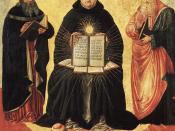The influence of Aristotle on Thomas Aquinas is evident from the fact that Thomas gave - had to give - knowledge gained by human reason quite a different value from what was usual in the theological tradition. There was no disputing the fact that reason has its own independence against faith. The new desire for knowledge, for science, had to be taken seriously. Earlier theologians had proved the justification for reason alongside faith. But, as he shows in the introductions to his two Summas, 'Thomas felt compelled to prove the justification for faith alongside reason (rationem fidei).'1 This was a completely new challenge which forced him to think through the relationship between faith and reason in a new, fundamental way.
For Thomas, there was no question that philosophy exists in its own right alongside theology. Not by permission of the church, but because of the nature of the order of creation.
'The creator God himself has endowed human beings with understanding and reason. Science is a 'daughter of God' because God is the 'Lord of the sciences' (Deus scientiarum dominus).'2 If one takes this seriously, the result is a liberating shift for all theology: a shift towards the creaturely and empirical, a shift towards rational analysis, and a shift towards scientific research. To be more precise, Thomas understood that in view of the new significance of reason, it was no longer appropriate to seek to combine the whole of reality without distinction into one great philosophical and theological union of reason and faith. Augustine's thought was no further use here, important though it remained in other spheres. No, in this time, no thought was publicly defensible in which philosophical truth was not a superior one with revealed truth, in which philosophical arguments could not be used for interpretation of the...


